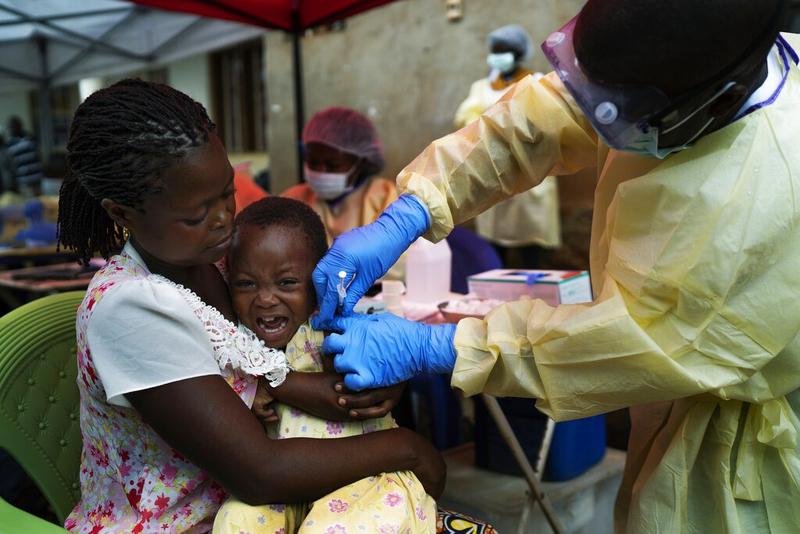 In July 13, 2019 file photo, a child is vaccinated against Ebola in Beni, Congo. (JEROME DELAY, FILE / AP)
In July 13, 2019 file photo, a child is vaccinated against Ebola in Beni, Congo. (JEROME DELAY, FILE / AP)
Three new cases of Ebola have been confirmed by health officials in the Democratic Republic of the Congo's northeastern province of North Kivu, bringing the total to five in the last 10 days. This comes five months after the end of a previous Ebola outbreak in the same province, said the World Health Organization on Monday.
Fresh cases were detected on Saturday in the district of Butsili, close to the city of Beni where the last outbreak was centered. Health officials said three people of the five confirmed cases have died.
Last week, health officials began an Ebola vaccination campaign in North Kivu where a case was confirmed on Oct 8. People at high risk, including contacts of the confirmed case and first responders, received vaccine doses as health authorities move to curb the spread of the virus.
"About 1,000 doses of the rVSV-ZEBOV Ebola vaccine and other medical supplies were delivered from the capital Kinshasa to Goma city in North Kivu. And around 200 doses were sent onward to Beni city, which is near the Butsili health area where the confirmed case was detected," said the WHO in a statement.
"Vaccinators are using the ring vaccination approach, where contacts and contacts of contacts are vaccinated. The Democratic Republic of the Congo has more than 12,000 vaccine doses in Kinshasa that can be deployed if necessary."
The International Rescue Committee, or IRC, said beating Ebola in the DRC now will be doubly complicated given the impact of COVID-19.
Dire situation
Kate Moger, regional vice-president for the Great Lakes region at the IRC, said another outbreak in the country could be disastrous if not quickly contained.
"People in this area have faced decades of violence by armed groups and have now, between Ebola and COVID-19, been faced with disease outbreaks for almost three straight years. These communities are still trying to rebuild from the impact that the last Ebola outbreak had on their health systems, as well as the emotional trauma from an increase in violence, particularly against women, all while fighting COVID-19. The COVID-19 pandemic has further exacerbated an already dire situation and led to a major increase in food insecurity and even more conflict," Moger said.
"It is imperative we apply the lessons learned from past outbreaks to stop the spread of Ebola in DRC and beyond its borders. The IRC stands in solidarity with the affected communities and is calling for immediate action and funding for frontline aid agencies to contain both outbreaks and prevent further spread."


